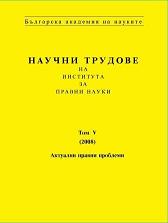Правен идентитет на Българската Православна църква
LEGAL IDENTITY OF THE BULGARIAN ORTHODOX CHURCH
Author(s): Maria KyossevaSubject(s): Law, Constitution, Jurisprudence
Published by: Институт за държавата и правото - Българска академия на науките
Summary/Abstract: There is historical and institutional continuity that the Bulgarian Orthodox Church is identical with the church which was recognized in 870, which is ground for the Orthodox denomination to be defined as a traditional religion by Article 13 (3) of the Constitution of the Republic of Bulgaria. Continuity is an element of the traditional. Using the notions of "legally individualizing features" or "legal individualization" in reference to the Bulgarian Orthodox Church is correct, but is not sufficient because the "legal identity" of the Bulgarian Orthodox Church is also an expression of something else — it reflects most precisely the uniqueness of the Church as a social phenomenon because it is triune with "continuity" and the "traditional", which are characteristic words for the Bulgarian Orthodox Church. In the part related to essential characteristics of the Bulgarian Orthodox Church the notion of "legal identity" is reasoned with its individual aspects — "spatial identity", "temporal identity" and "institutional identity", which for the Bulgarian Orthodox Church as a corporate legal person are an expression of the factors of Time and Identity. Identity is expressed in and is an expression of identity of the very individualizing markers in time, i.e. they have been invariable for centuries since the time the Bulgarian Orthodox Church was established — sustainability of religious beliefs as a constitutive and individualizing marker, which for the Bulgarian Orthodox Church is Orthodox faith, its name, the seat, which is changed because of historically conditioned needs, the sustainable statutory system, the structure through the diocese from the parish through the eparchy to the Patriarchate. All these markers taken together give the legal individualization of the Bulgarian Orthodox Church, but because separately and in conjunction they have been identical since its inception they imply something more, which is expressed through the "legal identity". The special attention paid to reasoning one of the constitutive elements for any Church such as religious belief, by which the churches differ from one another, distinguishes them from the other legal persons. This difference of religious denominations on the basis of the conviction of faith from other social formations gave the constitutional legislator the right to use the notion of "separateness" of the state from the religious institutions (Article 13 (2) of the Constitution). This is an expression of the modern principle of secularity in social relations in respect to the denominations and proves even at constitutional level the difference of the Bulgarian Orthodox Church as a unique social form "not of this world", which reflects on the legally individualizing features of the Bulgarian Orthodox Church, which determine it as a peculiar legal person.
Journal: Научни трудове на Института за държавата и правото
- Issue Year: 2008
- Issue No: V
- Page Range: 209-231
- Page Count: 23
- Language: Bulgarian
- Content File-PDF

